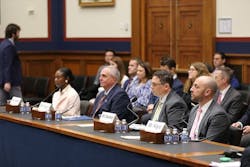Despite the date, this headline is no joke. Members of Congress are actually contemplating helping the trucking industry by repealing the prohibitive 12% federal excise tax, as opposed to adding more regulations that increase the cost of trucks.
On March 27, Congressman Doug LaMalfa (R-CA-01) reintroduced the Modern, Clean, and Safe Trucks Act (H.R. 2424), which if passed would amend IRS Code of 1986 by repealing the excise tax on new heavy trucks and trailers. Co-sponsors of the bipartisan bill include Rep. Chris Pappas (D-NH-1); Rep. Darin LaHood (R-IL-16); Rep. Salud Carbajal (D-CA-24); and Rep. Max Miller (R-OH-7).
A version of this bill was first introduced in 2023, though there were several earlier attempts to remove the tax, which began in 1917 to fund World War I. FET collections now go to the Highway Trust Fund. Applicable equipment include truck chassis and tractors over 33,000 lbs. and trailers over 26,000 lbs. Agricultural heavy equipment is exempt.
“For over a century, the federal excise tax on heavy-duty trucks has gone from a temporary wartime measure to fund World War I, to an outdated tax that punishes truck buyers,” Rep. LaMalfa stated in a release. “This is the highest percentage-based tax Congress imposes on any product, yet it fails to be a reliable source of funding for the Highway Trust Fund.”
Advocacy group American Trucks Dealers noted the fee raises the cost of a new diesel tractor by more than $22,000, and a battery-electric truck by $50,000. Fuel cell electric trucks like the now out-of-production Nikola FCEV reportedly cost $500,000, and the FET was applied to the original price before any incentives or grants. That means the FET was $60,000, or the price of a serviceable, but old, used truck.
“This tax forces buyers to stick with older, less efficient models and makes it harder for truckers to modernize their rigs, holding back the trucking industry from updating,” LaMalfa said.
This is exactly what Taki Darakos, VP of maintenance fleet services at Pitt Ohio, told the U.S. House of Representatives Committee on Transportation and Infrastructure Subcommittee on Highways and Transit at the end of last April.
“[The FET] limits me every year when I am forced to buy twenty or twenty-one trucks instead of twenty-five newer, cleaner tractors. Along with my entire industry, I support and encourage the passage of H.R. 1440, the Modern, Clean and Safe Trucks Act, to eliminate this World War I-era tax and spur further investment in the trucks with the latest safety and emissions reduction technologies.”
LaMalfa was on that subcommittee.
After the new bill to repeal the FET was introduced, we asked Darakos if he felt Congress is listening to the trucking industry more lately.
“I want to believe there was always a willingness to listen, but that the stakes are much higher because of how complex the transportation sector is and how rapidly the technology used within it is changing,” Darkos said. “The best way to advance policy and legislation is to actively listen to all of the stakeholders—and make sure that their voices are heard and taken into consideration in regards to benefitting the greater good.”
Overall, Darakos thinks removing the 12% tax “would help slow down the rapid acceleration in equipment costs that we are seeing out there.”
What the industry is saying
He’s not alone. Many groups came out with statements after the bill was reintroduced.
ATA President Chris Spear said:
“Keeping this antiquated tax on the books imposes an enormous hardship, particularly for the small fleets, family businesses, and independent truckers who make up the overwhelming majority of trucking. Removing this burden will allow motor carriers to replace their trucks with modern, safer, and cleaner equipment, which will in turn provide a boost to manufacturing jobs.
The NTEA released a statement questioning the long-term viability of using truck sales to fund highway maintenance:
"NTEA continues to call on Congress to repeal FET. Eliminating this tax would provide Congress the opportunity to create long-term stability in the Highway Trust Fund by replacing FET with a funding source not based on annual truck sales. Repealing FET would reduce the acquisition cost of new trucks currently subject to the tax by 12% and allow purchasers to more readily integrate cleaner and safer vehicles into their fleet. Additionally, repeal would clear the way to better alternative funding mechanisms for highway repair and maintenance."
Eric Sauer, CEO, California Trucking Association, said:
“By repealing the Federal Excise Tax, Congress is paving the way for the broader adoption of cleaner, more fuel-efficient trucks. This effort will encourage trucking companies across California to invest in state-of-the-art equipment, including zero-emission technologies, supporting both our environmental goals and the continued development of innovative solutions. It's a win for the environment, the economy, and our industry.”
On the trailer side, Ryan Streblow, President and CEO of National Tank Truck Carriers, stated:
“Repealing this 12% tax would empower our industry to reinvest in the specialized equipment we need—equipment that features critical safety enhancements and cleaner-emission power units to serve the U.S. bulk segment. As costs continue to rise, this tax remains a significant barrier to upgrading our fleets and supporting a safer, more sustainable supply chain.”
About the Author

John Hitch
Editor-in-chief, Fleet Maintenance
John Hitch is the award-winning editor-in-chief of Fleet Maintenance, where his mission is to provide maintenance leaders and technicians with the the latest information on tools, strategies, and best practices to keep their fleets' commercial vehicles moving.
He is based out of Cleveland, Ohio, and has worked in the B2B journalism space for more than a decade. Hitch was previously senior editor for FleetOwner and before that was technology editor for IndustryWeek and and managing editor of New Equipment Digest.
Hitch graduated from Kent State University and was editor of the student magazine The Burr in 2009.
The former sonar technician served honorably aboard the fast-attack submarine USS Oklahoma City (SSN-723), where he participated in counter-drug ops, an under-ice expedition, and other missions he's not allowed to talk about for several more decades.

